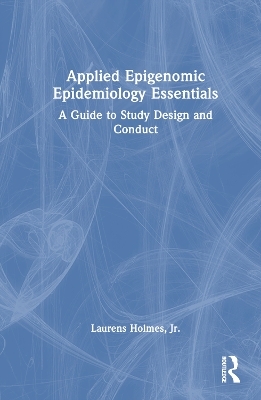
Applied Epigenomic Epidemiology Essentials
Routledge (Verlag)
978-0-367-55642-6 (ISBN)
Epidemiology has a vital strategic role in facilitating and leading evidence discovery in all aspects of human health, with the intent of improving patient and public health through disease control and health promotion practices. It emphasizes what we now know about the transformation the human body and the ecosystem undergo as a result of social structure, environment, daily challenges and mutation. The first part of this text explores the origin of epidemiology, its relationship with medicine and public health, and its role in assessing disease distribution as occurrence or frequency, risk factors, treatment and management. The main direction of this text is to explore the assessment of how gene and environment interactions, termed epigenomic modulations, aberrantly predispose to morbidity, prognosis, survival and mortality at the individual as well as the specific population level.
This text presents a novel approach based mainly on epigenomic modulations in the application of epidemiologic investigation in disease incidence, morbidity and mortality at a specific population level for graduate education in public health and clinical sciences as well as medical education.
Laurens Holmes, Jr. is a specialist in Immunology and Infectious Disease as well as an expert in cancer epidemiology and biostatistical modeling. He is a major proponent of aberrant epigenomic modulations in disease incidence, morbidity, prognosis, mortality and survival; and a former Head of the Epidemiology Laboratory at the Nemours Center for Childhood Cancer Research, Wilmington; former clinical and translational science education and training director, Medical College of Wisconsin, Milwaukee; as well as a former Professor of Molecular Epidemiology and Clinical Trials at the University of Delaware, USA. Professor Holmes is currently the Director of the Graduate Public Health Program at Delaware State University, Dover, USA.
Part 1: Epidemiology and Epigenomic Epidemiology Contribution in Clinical Medicine and Public Health. 1.Introductory Epigenomic Epidemiology: Basic Concepts and Application. 2.Public Health, Epidemiology and Translational Epigenomic Epidemiology Perspective. 3.Scientific Research Concept and Application: Public Health, Clinical Medicine and Epigenomic Epidemiology Studies. 4.Disease Ascertainment—Diagnostic and Screening Test. 5.Epigenomic Epidemiology: Disease Association, Etiology, Prognosis and Outcomes. Part 2 Traditional and Modern Epidemiologic Designs 6.Measures of Disease Occurrence and Effect or Association. 7.Ecologic Design. 8.Cross-Sectional Study Design (Non-experimental). 9.Case-Control (Comparison/Non-Case) Design. 10.Cohort Designs: Prospective, Retrospective, Ambi-directional. 11.Human Experimental Design—Clinical Trials. 12.Epidemiologic Causal Inference: Causality Web, Meta-Analysis, Quantitative Evidence Synthesis (QES). Part 3 Laboratory Techniques and Epigenomic Mechanistic Process in Epidemiologic Principles, Concept and Application. 13.Epigenomic Laboratory Procedures: Mechanistic Process and Techniques. 14.Epigenomic Studies Perspective: Malignant Neoplasm, Protastic Adenocarcinoma—Prostate Cancer CaP. 15.Pediatric Acute Lymphoblastic Leukemia (ALL): Aberrant Epigenomic Modulation Surrogate. 16.Cardiovascular Disease (CVD) : DNA Methylation of Candidate Genes (ACE II, IFN-γ, AGTR1, CKG, ADD1, SCNN1B and TLR2) in Essential Hypertension.
| Erscheinungsdatum | 05.12.2023 |
|---|---|
| Zusatzinfo | 31 Tables, black and white; 24 Line drawings, black and white; 24 Illustrations, black and white |
| Verlagsort | London |
| Sprache | englisch |
| Maße | 156 x 234 mm |
| Gewicht | 648 g |
| Themenwelt | Sachbuch/Ratgeber ► Gesundheit / Leben / Psychologie |
| Studium ► Querschnittsbereiche ► Epidemiologie / Med. Biometrie | |
| Studium ► Querschnittsbereiche ► Infektiologie / Immunologie | |
| ISBN-10 | 0-367-55642-1 / 0367556421 |
| ISBN-13 | 978-0-367-55642-6 / 9780367556426 |
| Zustand | Neuware |
| Informationen gemäß Produktsicherheitsverordnung (GPSR) | |
| Haben Sie eine Frage zum Produkt? |
aus dem Bereich


